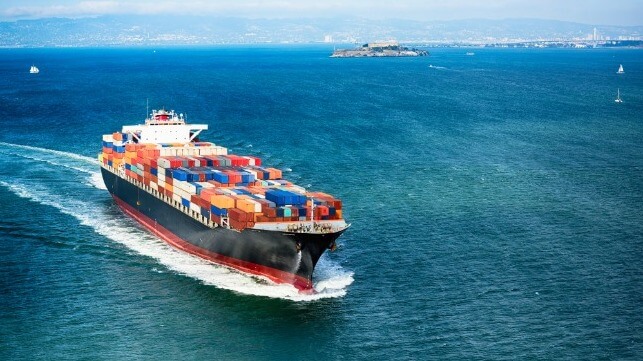Containership Schedule Reliability Dipped to New Low at Start of 2022

Schedule reliability for the global container lines has fallen to a record low according to new data from the analysts at Sea-Intelligence. The decline continues the trend seen across the major routes in the last six months of 2021 and comes despite a slight improvement for the average delay and large increases in capacity on the major routes between Asia and North America.
“Schedule reliability dropped again,” said Alan Murphy CEO of Sea-Intelligence pointing out that it was down nearly a full percentage point between December 2021 and January 2022. Recording just 30.9 percent schedule reliability in January 2022, Murphy noted that the figure is, “the lowest ever global schedule reliability since Sea-Intelligence started the measure in 2011.”
Sea-Intelligence analyzes more than 60 major carriers tracking their performance across 34 different trade lanes. During all of 2021, they highlighted the low level of reliability which averaged just under 36 percent compared to an average of over 70 percent for the three prior years. Reliability peaked at just 40 percent in March 2021 before beginning its steady decline in the second half of the year.
The average delay for late vessel arrivals decreased slightly Murphy highlights reaching 7.38 days for January down from 7.68 days in December and after having surpassed 7 days in July 2021. Murphy noted that January 2022 was the sixth consecutive month with the delay figure above 7 days. For the full year, the average was nearly 6.9 days in 2021.
Delays continue to contribute to the lack of schedule reliability as carriers are finding their ships often waiting for berth space when arriving at key container ports. Delays across Asian routes are contributing to the carriers’ problems with the lines most concentrated on Asia reporting the lowest reliability. Evergreen, OOCL, Wan Hai, and COSCO were all reported to be below 20 percent reliability in January 2022 according to Sea-Intelligence, while Maersk and Hamburg Sud with services less concentrated on Asia were reported to have the best performance with both over 40 percent reliability.
The low schedule reliability comes as carriers' continued to increase capacity on the primary routes between Asia and North America. Sea-Intelligence analyzed the capacity on the major trade routes following the Chinese New Year holiday reporting strong increases versus previous years.
“On Asia-North America West Coast, deployed capacity is scheduled to be higher in nearly all of the post-CNY weeks in 2022, with some weeks reaching an excess of 100,000 TEU over the 2017-2019 average,” noted Murphy. “We can see just how much capacity has been flowing towards the West Coast ports in both 2021 and 2022 in the 12 weeks after CNY.”

that matters most
Get the latest maritime news delivered to your inbox daily.
Sea-Intelligence estimates that carriers increase by another 60,000 TEU per week, to a new peak of 363,900 TEU after Chinese New Year this year. “With no slowdown in deployed capacity during CNY in 2022, this high level of average weekly capacity in the 12 weeks that follow, will put even more stress on the West Coast ports,” forecasts Murphy.
Annualized for the full year, Sea-Intelligence forecasts that capacity will grow by 20 percent in 2022 over 2019 in the 12 post-CNY weeks, while Asia-North America East Coast will see a staggering 40 percent increase in capacity. They also forecast that this strong capacity growth will increase the likelihood that the U.S. East Coast ports will also start to feel the stress of additional cargo.
